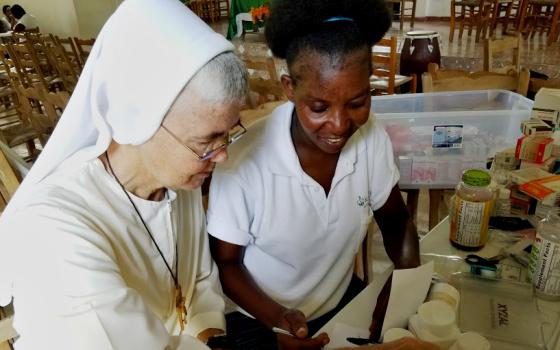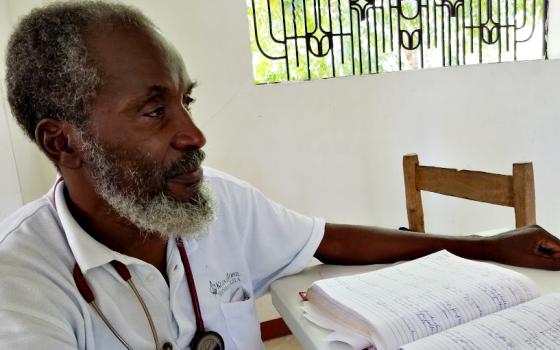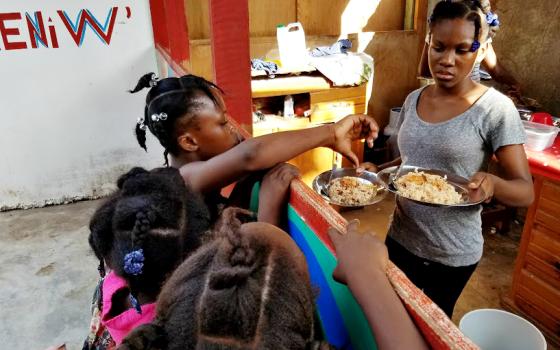A small mission run by two sisters based in La Tremblay, outside Haiti's capital of Port-au-Prince, has established a medical clinic serving dozens of families, assists a school program for about 90 elementary-age children, and created a microlending program to help women in a nearby village.
For Charity Sr. Dianne Moore and Sr. Susan Kanuu Nchubiri, a Maryknoll sister from Kenya, the four years in Haiti have provided lessons in success and perseverance.
In Jacmel, on Haiti's southern coast, Felician Srs. Mary Inga Borko and Marilyn Marie Minter help run a mobile clinic, an afternoon afterschool feeding and tutoring program and provide spiritual care for their neighbors. They have found similar challenges, as well as moments of grace and hope.
Both sets of sisters, and others who work in Haiti, speak of the importance of "accompaniment" — the spiritual underpinning of their work that keeps them bonded to the people they serve. That sense is particularly important in Haiti, where frustrations are many and where success, in the traditional sense of the word, can be spotty.
"All we can do is help them tap into what they already have," said Moore, who, like Nchubiri, frequently uses the terms "accompany" and "accompaniment" to describe what they and other sisters do in Haiti.
"I would define it as being present with people, and addressing the situation as best as possible," Nchubiri said. "If it doesn't work, you look at another solution. Part of it is just being present. People in Haiti have so many needs."
Those needs are apparent in La Tremblay which, as Moore said recently, is becoming "less and less country and more and more city," pointing to settlements of houses and apartments nearby. Yet some challenges have a distinctly rural aspect: Some people in the nearby village of Cuvier still walk 90 minutes to the nearest large market to sell their wares.
Not even the rains of Hurricane Matthew in October helped alleviate a drought in Tremblay and Cuvier, making it harder to sustain small gardens for growing vegetables.
And growing vegetables is important — residents of Cuvier depend on them both for food and income. But there have been challenges getting pumps and irrigation systems to work properly.
"Our gardens are suffering," said resident Dieuvenite Mathurin. Yet she and Cuvier neighbors Estela Claude and Nadege Francois are members of a small group of women who have come together as a women's collective with the help of Moore and Nchubiri. They believe their collective efforts will pay off for a better life in the future.
"I don't want my children to be raised as I was," Francois said, referring to her lack of formal education. "I want them to go to university or college and have some success."
'If there is no way, Haitians will find a way'
The women's hopes reflect those of a long-struggling, impoverished country, and are no less poignant for Moore and Nchubiri, who say their role is to "accompany" the residents of villages near La Tremblay on their journey.
"All we can do is help them tap into what they already have," said Moore.
"To survive here, you really have to change your expectations," she said. "It's all about letting go. We are not going to change Haiti or 'fix' Haiti. You just do your best and help Haitians access their own internal resources."
And that is a gift, she said. "Haitians have much to offer us. We have much to learn from them. They are creative. They are innovative. If there is no way, Haitians will find a way."
Standing alongside those they work with means "being present with people, and addressing the situation as best as possible," Nchubiri said. "If it doesn't work, you look at another solution. Part of it is just being present. People in Haiti have so many needs."
"Accompaniment" has become a common theme among those involved in mission work and is a particular focus among sisters. The idea has been championed by Pope Francis and stems from a belief that old modes of mission tended to put the role of the outsider too much at the center of things.
Practicing accompaniment "is highly personal and deeply relational," write Michael Griffin and Jennie Weiss Block in their introduction to a book of conversations between noted humanitarian Dr. Paul Farmer and renowned liberation theologian Fr. Gustavo Gutiérrez.
"Accompaniment of the lonely poor involves walking with — not behind or in front — but beside a real person on his or own particular place and time, at his or own particular pace," Griffin and Block write in the book, In the Company of the Poor.
"Accompanying others in their struggles for survival does not have a beginning or end, and there is no outside plan to be imposed. It often means being present to terrible suffering, being thrown into chaotic circumstances, encountering unexpected problems and difficult situations with no easy solutions."
The mission based in La Tremblay — known as Partners in Mission/Spirit Alive-Haiti — has undergone a number of tests and twists, trials and turns since it began in 2013 as a joint mission between the Maryknoll Sisters of St. Dominic and the Sisters of Charity of St. Elizabeth, Convent Station, New Jersey.
The latest test is that Nchubiri, like another Maryknoll sister involved in the mission, has left Haiti, with Maryknoll now having no formal presence in Haiti.
"We have been honored to serve the people of Haiti for these few years. It is with great sadness now, due to unforeseen circumstances and our limited personnel, that we are not able to continue," according to a statement by the Maryknoll Sisters Congregational Leadership Team. Nchubiri is now working at the Maryknoll Motherhouse in Ossining, New York.
Still, Nchubiri recently returned to Haiti at year's end to be happily "connecting with my friends here," she said, and she remains a staunch proponent of the kind of low-key but vital work the mission does. "It gives us an opportunity to live a consecrated life," Nchubiri said. "Here, every day is a challenge."
Success, but at a slow pace
Though Nchubiri's departure was a disappointment for both her and Moore, preparing for it provided some time to reflect on their work and what the idea of accompaniment has meant. Both sisters say they had high expectations for a cornerstone of the mission — a microcredit lending program funded initially by Maryknoll, giving the women the chance to begin small businesses, usually selling rice, beans, vegetables and kitchenware at markets.
Women used the money they earned to pay back the initial loans, leading them to feel "they can sleep in peace because they don't owe money anymore," Nchubiri said.
They call the program largely a success, but note that the pace has sometimes been slow.
"It is a success in the sense that the women pay back the money on time in five-month installments, then they can borrow it back," Nchubiri said. "What is slow is that I expected them to be able to diversify the products they put in the market so they can grow faster but it didn't take root."
Maybe their expectations were too high about how quickly money could circulate and expand, Nchubiri and Moore said. "We just have to keep in mind that people are just trying to get through the day," Moore said. "That's been a hard learning, and we've had to let go of our own expectations. It has to be their dream, their expectations, all we can do is accompany them, walk the journey with them."
Even so, Nchubiri said a partnership with the U.S.-based nongovernmental organization Rich in Mercy had opened up additional monies for the Haitian women to borrow — a much-needed cushion since "the price of things has gone really high compared to when we started the micro-credit program in 2014," she said. (Partnerships with nongovernmental organizations, both secular and church-based, are common for sisters working throughout Haiti.)
Accompanying people means being available to hear people's problems, offering advice when asked, and prodding when necessary.
At times, though, "it's humbling," Moore said. "Sometimes we don't have a clue."
Frustrations are normal. Take the issue of the drought and water. In the wake of "not having a real rainy season since I've been here," Nchubiri said, getting water to the communal gardens has been difficult. There is one agricultural pump for hundreds of people in several villages, Cuvier included, and costs to use the pump are high.
Despite the often-slow pace of things, and the common expectations that non-Haitians like the sisters have to initiate projects, Moore said, "I believe we've made an impact. Some seeds have been planted."
Neighbors and friends agree. Baptist Pastor Jordany Bienaimé who is in charge of the school program at Cuvier, said the mission has helped find funding for the primary school, and the clinic is the only available medical service for the town's 1,200 residents.
"Oh, they work hard here," he said of the sisters. "Sister Susan and Sister Diane work really hard."
Discerning, listening, hearing people's stories
In Jacmel, on Haiti's southern coast, Borko and Minter also speak of their work in the context of accompaniment. "It's a ministry of presence," Borko said, with constant attention in asking, " 'How do we walk in relationship, how should we work in relationship with the people of God?' "
She added, "We did not come here, 'to teach them.' There are a lot of things we don't understand."
Minter agrees. "It's always about discerning — listening and hearing people's stories," she said. "We just want to be among people and walk with them."
The Felician sisters' ministry, established in 2012 after shorter-term work that began after the 2010 earthquake, includes helping run a mobile clinic, as well as schooling and feeding programs for children and youth — all needed and wanted by the community. A quieter but no less important part of their work is in providing religious and spiritual guidance.
Minter makes her clinic rounds, working with Haitian colleagues Rosemanie Dezamour, a pharmacist, and Dr. Yves Derisier, a medical doctor.
The mobile clinic serves 500-900 patients a month, many from surrounding villages in the hills above Jacmel. Consultations are 100 Haitian gourds — about $1.50 -- a charge Minter said affords "people some dignity."
Borko said that "giving out everything" is not good — it can deepen the problems of dependency, a problem both Haitian and non-Haitians involved in humanitarian work worry about.
Among the common ailments are high blood pressure, anemia and arthritis. Malaria is also a problem, as are hunger and poor diets.
"People will eat a piece of sugar cane [for a meal]," Derisier said. He added that educating people about diet is essential, but the challenges of poverty make easy choices difficult.
He praises the sisters for their work — "everyone knows what the Felician sisters are doing" — but feels frustrated that a weakened government cannot, or does not, provide the services that missions and nongovernmental organizations provide. Political tensions and problems in Jacmel also contribute to the challenges. Doctors in the public sector were out on strike recently because they had not been paid for months.
"It's not fair, it's not fair," he said of the challenges facing Haiti. "Everything in Haiti is political. Everything." The result, he said, is that people like physicians often can't do their jobs properly.
'They know how to live with the people'
Minter listened to Derisier knowingly and said all they can accomplish is to do the best they can with limited resources.
"I think it's about one person at a time," she said.
Minter and Borko reflected on that theme, with both saying that as imperfect as it is, there is a spiritual underpinning to their work as "accompaniers" that is essential.
"You can help people, but you have to be careful because you can slip into simply 'helping people,' " Borko said. "We always ask, 'Is there any progress in the life of that person?' Sometimes there is, and sometimes there is not."
The two sisters believe whatever is being done is in God's hands, not theirs. "God is working with us," Borko said.
Later that afternoon, children arrived for tutoring and a hot meal. The smell of freshly cooked rice and beans wafted through the small compound. One of the tutors, 18-year-old Junior Dessin, said he felt a sense of love and respect from the women, and said the fact they are not Haitian made no difference to him or to others. "They have God's love in them," he said. "They know how to live with the people."
As the afternoon ended, Minter said she and Borko are realistic and modest about what they do. But she said with great animation that, in Jacmel, she feels a great beauty in "accompanying people."
"For 40 years I've been a religious," said Minter, 60, "and for the first time I feel like I am fully living my vows."
A poignant moment in that journey came in 2010. A girl Minter befriended at a "tent city" for earthquake survivors in Port-au-Prince may have helped plant a seed for her future work in the country by asking: " 'Are you going to come here, love us and then leave us?' "
Though Minter said she and Borko did not formally seek an assignment in Haiti, the work they did following the quake prepared them for a longer-term assignment. At the invitation of Bishop Launay Saturne, she and Borko arrived in Jacmel in December 2012. "We did not seek the assignment, we had no plan, we just responded to a call to be among God's people, and the needs came to us," Minter said.
In her work in the United States — for many years in the archdiocese of Newark, New Jersey — Minter was a vocations specialist, speaking on the lecture circuit, even working with a Christian rock band. "I traveled a lot; I had everything I needed," she said.
In Jacmel, "it is what the day will bring. You have to go with the flow," Minter said, noting the chaotic, messy and often-improvised reality of Haiti's day-to-day life. She paused. "If you want to live your vows, you need to come to Haiti."
Back in La Tremblay, Moore agreed, viewing her work and the work of other sisters in Haiti as a small piece of something larger, allowing sisters to "go back to the basics."
"We're not a large NGO. As religious, we can be truly who we are in Haiti," she said. "We can let it all go, and not expect perfection. Just be who we are called to be. Not just as religious, but as Catholics. Be truly present."
[Chris Herlinger is GSR international correspondent. His email address is cherlinger@ncronline.org.]








